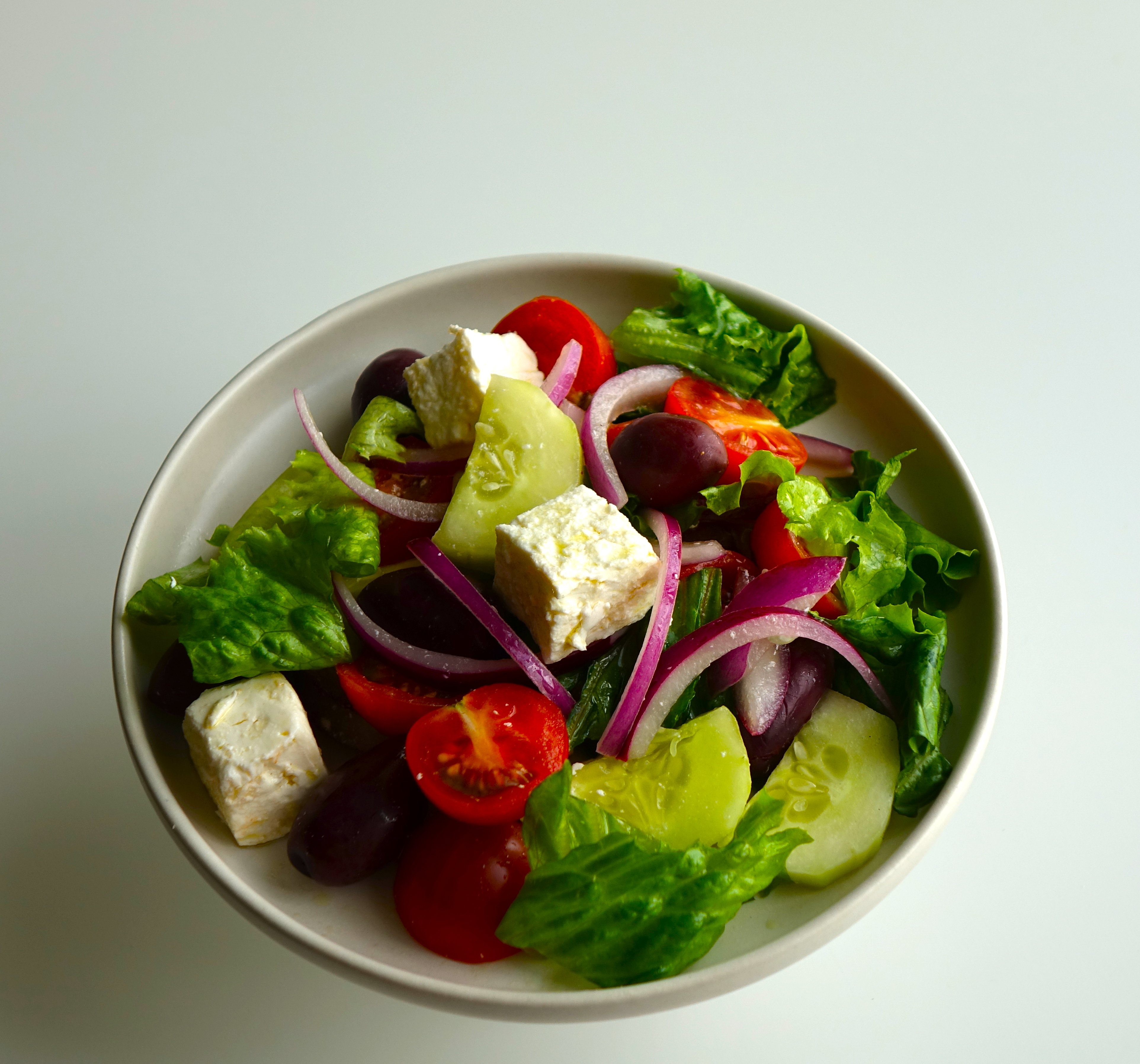
Greek Salad recipe is a healthy quintessential dish that celebrates fresh, high-quality produce and the art of simplicity in cooking, reflecting the Greek philosophy of enjoying life and meals with zest and leisure.
- Servings 3
- Prep time 15 minutes
- Three small ripe tomatoes, cut into halves
- One cucumber peeled and sliced into thick half-moons
- Medium Iceberg lettuce, three leaves
- Half a cup of Kalamata olives pitted or whole
- Half a cup of feta cheese, crumbled or cut into small cubes
- Three tbsp. of extra virgin olive oil
- One tbsp. of red wine vinegar
- One small red onion, thinly sliced
- Salt and freshly ground black pepper to taste
- Fresh parsley, chopped (optional, for garnish)
- Combine the tomato wedges, sliced cucumber, lettuce and thinly sliced red onion in a large salad bowl.
- Add the Kalamata olives and feta cheese to the bowl. Drizzle the extra virgin olive oil and red wine vinegar over the salad.
- Sprinkle, salt and freshly ground black pepper.
- Toss everything gently to combine. Be careful not to break the feta cheese too much; you want it to remain in decent-sized chunks for texture and flavor.
- If using, garnish with chopped fresh parsley.
- Serve immediately, or let it sit for about 10 minutes at room temperature to let the flavors meld together.
- Quality Ingredients: Greek salad’s simplicity means the quality of each ingredient really shines through. Use the best quality feta cheese and olives you can find.
- Dressing: The classic dressing is simple – olive oil, vinegar, vinegar, oregano, salt, and pepper. Adjust the quantities based on your taste preferences. Some prefer more vinegar for a tangier taste, while others might want more olive oil for richness.
- Serving: Greek Salad is best served fresh. However, if you need to prepare it beforehand, combine all the ingredients except the dressing and feta cheese. Add these just before serving to keep everything fresh and prevent the salad from becoming soggy.
- Variations: Feel free to add other ingredients like bell peppers, oregano or capers for extra flavor and color.
Enjoy your refreshing Greek Salad recipe! It’s perfect as a light meal or a side dish for grilled meats or fish.
The health benefits of Greek salad can be attributed to its nutrient-dense components, each contributing to a healthy diet in its unique way. In this article, we’ll explore the nutritional value of Greek salad and the scientific evidence supporting its health benefits.
Tomatoes are a good source of vitamins C and K, potassium, and folate. They are also rich in antioxidants, including lycopene, which has been linked to reduced risk of heart disease and cancer.
Cucumbers are high in water content, making them hydrating. They also provide a modest amount of vitamins K and C and potassium.
Onions offer a good source of vitamin C, vitamin B6, potassium, and folate. They contain antioxidants and compounds that have anti-inflammatory properties.
Feta Cheese provides calcium, phosphorus, and B vitamins. It’s a good source of protein and contains beneficial probiotics.
Olives and Olive Oil are high in monounsaturated fats, particularly oleic acid, which has been associated with heart health. Olive oil is also rich in antioxidants, including vitamin E and polyphenols.
Cardiovascular Health: The Mediterranean diet, which includes Greek salad as a staple, is renowned for its cardiovascular benefits. A landmark study published in the “New England Journal of Medicine” demonstrated that individuals following a Mediterranean diet supplemented with extra-virgin olive oil or nuts had a significantly lower risk of major cardiovascular events than those on a reduced-fat diet (Estruch et al., 2013). The monounsaturated fats in olive oil and olives can help reduce LDL cholesterol levels and improve heart health.
The antioxidants in Greek salad ingredients, such as lycopene in tomatoes, vitamin E in olive oil, and various polyphenols, are crucial in combating oxidative stress. A review in the “Journal of Agricultural and Food Chemistry” highlighted that dietary polyphenols could protect against several diseases, including cancers and cardiovascular diseases, by neutralizing free radicals (Pandey & Rizvi, 2009).
Bone Health: Calcium and phosphorus in feta cheese are essential for bone health. Vitamin K, present in cucumbers and especially in the dressing’s olive oil and oregano, is crucial for bone metabolism. Research indicates that higher vitamin K intakes are associated with a lower risk of fractures (Feskanich et al., 1999, “American Journal of Clinical Nutrition”).
Hydration and Weight Management: The high water content in cucumbers and tomatoes contributes to hydration, which is vital for all bodily functions. Greek salad is also low in calories yet rich in fibre and protein, mainly if you include ample vegetables and a good portion of feta cheese. This combination can help manage weight by promoting a feeling of fullness and reducing overall calorie intake.
Considerations: While Greek salad offers numerous health benefits, individual dietary needs and conditions should be considered. For instance, feta cheese, while nutritious, is high in sodium, which some individuals may need to limit. Likewise, the calorie content can increase significantly with the amount of olive oil and cheese added, so portions should be mindful.
Conclusion: Greek salad is not only a delicious and refreshing meal option but also packs a variety of nutrients that contribute to a healthy diet. Its components offer a range of health benefits, particularly for heart health, antioxidant protection, bone health, and weight management. Incorporating Greek salad recipe into a balanced diet, mindful of portions and individual nutritional needs, can be a delightful way to support overall health.

